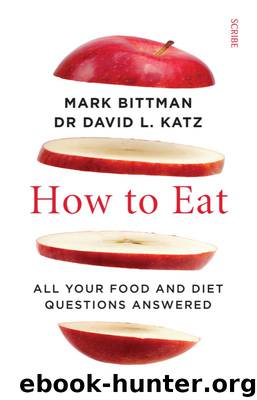How to Eat by Mark Bittman;David L. Katz;

Author:Mark Bittman;David L. Katz;
Language: eng
Format: epub
Tags: HEA048000, SCI086000, MED060000, HEA019000, MED021000, CKB039000
Publisher: Scribe Publications
Published: 2020-03-02T16:00:00+00:00
FAKE MEAT
What’s your advice about meat alternatives?
Well, for starters — what alternatives, and what meat? The net benefits of substituting plant foods for meat/animal foods depends on the quality and composition of both. It’s more important, for instance, to displace processed meat from your diet than to displace unprocessed meat; more important to displace fatty, factory-farm-raised meat than lean, locally sourced, pasture-raised meat; more important to displace beef than fish; and so on. And then there is a whole range of plant alternatives that also vary in composition and benefits.
I was thinking about “fake meat” like Beyond Meat and Impossible burgers . . .
You and everybody else these days. The particular advantage in these products, which certainly qualify as “ultraprocessed,” is that, when it comes to the population at large, they can potentially win over people who really like to eat meat, eat it routinely, and are not inclined to give up beef for beans, or those people who’d like to eat less meat but have trouble doing so. Whether these products offer a health benefit is uncertain, but they certainly have lower environmental impact than meat, and are obviously better for animals — two good reasons to consider them. Whether you’re an omnivore or a vegetarian, they can be good options to satisfy the occasional burger craving, or a convenient meat-free option if you’re out and about or at a restaurant. As usual, the question is “Instead of what?” Instead of a conventional Whopper? Sure. But instead of almost any meal cooked from scratch using basic ingredients? Probably not. This is ultraprocessed food.
Simply put: If you’re inclined to eat meat, make it a small part of your diet, and make it as pure as possible — from ethically treated, well-fed, well-tended, well-exercised animals. When you’re not eating meat, the more you stick with whole plant foods, on their own or as ingredients, the better; they’re better for us, our fellow creatures, and the environment.
So what’s the bottom line?
What meat you are replacing, and what you are replacing it with — both matter. For the sake of the planet, the less meat — especially beef and other mammals — we all eat, the better. If you’re unwilling to forgo meat unless your veggies imitate it, then by all means try Beyond, Impossible, and related offerings that tempt you. But if you’re willing to stick with whole plant foods on their own or as ingredients — that’s even better.
Download
This site does not store any files on its server. We only index and link to content provided by other sites. Please contact the content providers to delete copyright contents if any and email us, we'll remove relevant links or contents immediately.
How to Be a Bawse: A Guide to Conquering Life by Lilly Singh(7135)
Deep Work by Cal Newport(6490)
The Longevity Diet by Valter Longo(4835)
The Fat Loss Plan by Joe Wicks(4595)
The Four-Pack Revolution by Chael Sonnen & Ryan Parsons(3769)
The Ultimate Bodybuilding Cookbook by Kendall Lou Schmidt(3680)
The French Women Don't Get Fat Cookbook by Mireille Guiliano(3381)
Super Food Family Classics by Jamie Oliver(3234)
Not a Diet Book by James Smith(3125)
Turn Up Your Fat Burn! by Alyssa Shaffer(3039)
Factfulness_Ten Reasons We're Wrong About the World_and Why Things Are Better Than You Think by Hans Rosling(3025)
Tom Kerridge's Dopamine Diet: My low-carb, stay-happy way to lose weight by Kerridge Tom(2929)
Self-Esteem by Matthew McKay & Patrick Fanning(2924)
Body Love by Kelly LeVeque(2890)
The Unbecoming of Mara Dyer by Michelle Hodkin(2831)
The Fat Chance Cookbook by Robert H. Lustig(2619)
Tone Your Tummy Type by Denise Austin(2609)
LL Cool J's Platinum 360 Diet and Lifestyle by LL Cool J(2569)
Men's Health Best by Men's Health Magazine(2364)
